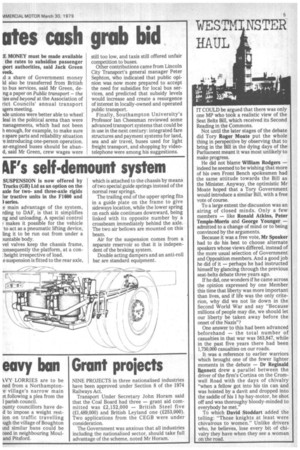WESTM NSTER HAUL
Page 7

If you've noticed an error in this article please click here to report it so we can fix it.
IT COULD be argued that there was only one MP who took a realistic view of the Seat Belts Bill, which received its Second Reading in the Commons.
Not until the later stages of the debate did Tory Roger Moate put the whole thing in perspective by observing that to bring in the Bill in the dying days of the Parliament meant it was most unlikely to make progress.
He did not blame William Rodgers — indeed he seemed to be wishing that more of his own Front Bench spokesmen had the same attitude towards the Bill as the Minister. Anyway, the optimistic Mr Moate hoped that a Tory Government would introduce a similar Bill, with a free vote of course.
To a large extent the discussion was an airing of closed minds. Only a few members — like Ronald Atkins, Peter Temple-Morris and George Younger — admitted to a change of mind or to being convinced by the arguments.
Because it was a free vote, Mr Speaker had to do his best to choose alternate speakers whose views differed, instead of the more usual selection of Government and Opposition members. And a good job he did of it — perhaps he had instructed himself by glancing through the previous seat-belts debate three years ago.
If he did, one wonders if he came across the opinion expressed by one Member this time that liberty was more important than lives, and if life was the only criterion, why did we not lie down in the Second World War and say "Because millions of people may die, we should let our liberty be taken away before the onset of the Nazis"?
One answer to this had been advanced beforehand — the total number of casualties in that war was 583,847, while in the past five years there had been 1,750,000 casualties on our roads.
It was a reference to earlier warriors which brought one of the fewer lighter moments in the debate — Dr Reginald liennett drew a parallel between the driver of the firm's Cortina on the Cromwell Road with the days of chivalry "when a fellow got into his tin can and was hoisted by a davit and dropped into the saddle of his 1 hp hay-motor, he shot off and was thoroughy bloody-minded to everybody he met."
To which David Stoddart added the telling: "Those knights at least were Chivalrous to women." Unlike drivers who, he believes, lose every bit of chivalry they have when they see a woman on the road.
























































































